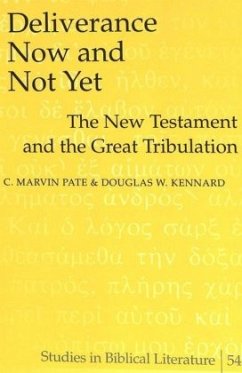Deliverance Now and Not Yet follows Albert Schweitzer's view of mystically dying with Christ and Merkabah mysticism at Qumran to propose that the New Testament pictures Christ's atonement with mystical implications. These pictures set up three forms of New Testament eschatology: consistent, inaugurated, and realized. With regard to the relationship of the Church and the Great Tribulation: (1) Paul and John present deliverance now (realized eschatology), and (2) the rest of the New Testament presents deliverance not yet in two categories - (2a) Mark, James, Peter, and Jude present deliverance not yet (consistent), and (2b) Matthew, Luke - Acts, Hebrews, and Revelation portray deliverance as now and not yet (inaugurated eschatology). Taken together, the Christian's experience of the Messianic woes and mystical expression of the Kingdom prompts us to long deeply for the climactic expression of the Kingdom of God.
Bitte wählen Sie Ihr Anliegen aus.
Rechnungen
Retourenschein anfordern
Bestellstatus
Storno

